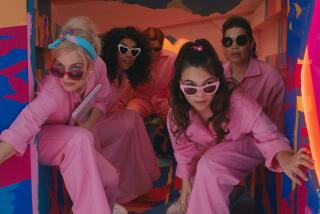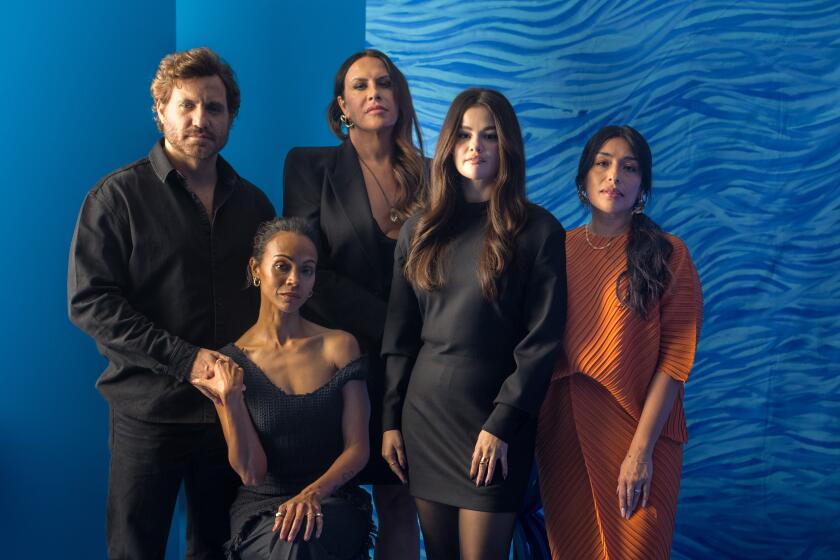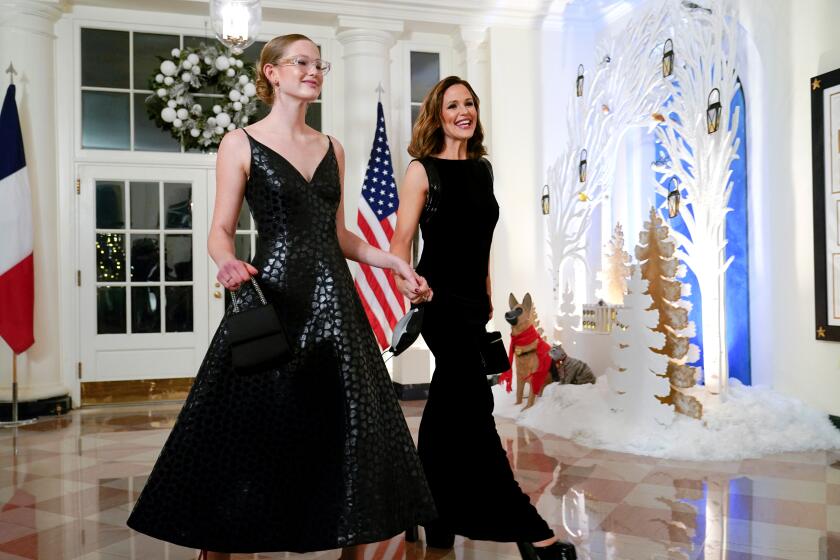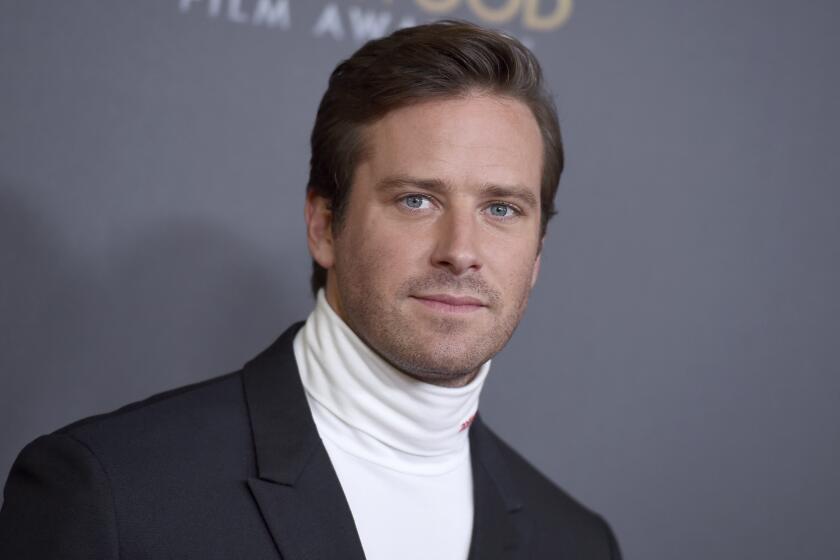Cairo struggles to stay a city of ‘action’
A Jeep Cherokee rolls down the street in the Zamalek district. Actor Amr Waked, with rectangular jaw and piercing blue eyes, sits behind the steering wheel. The production team runs behind him, stumbling past pedestrians on the sidewalks. Nearby police officers curiously eye the spectacle.
“The Aquarium” is set in late 2006, when the avian flu epidemic and a massive wave of political unrest spread fear across Egypt. Amid the slaughtering of chickens and the beating of demonstrators, the film zooms in on 48 hours in the lives of two strangers.
Waked plays Youssef, a well-heeled anesthesiologist. He works at a pricey hospital by day but an illegal abortion clinic at night. Daily he drives past the city aquarium, dreaming of entering, but he can never overcome his anxieties by stopping and simply going inside. Instead he gets his kicks from listening to the ravings of his patients, while they’re under anesthesia, then retelling them their secrets.
Hind Sabri plays Leila, hostess of the radio talk show “Night Secrets.” She listens to others’ confessions before retreating into her own fearful world, dominated by her overbearing mother. By the end, the strangers meet. “Both of them are like vampires,” says director Yousri Nasrallah. “They suck the inner life out of people they listen to. The metaphor of the aquarium is about feeling as though people are looking at others from behind aquarium glass.”
For decades, Egyptian film served as the cultural glue that held the Arab world together. Cairo produced extraordinary and artful cinema as well as popular entertainment. But movies like the “The Aquarium” or 2005’s “The Yacoubian Building” have become rare. Rapidly shifting values, economics and technologies have combined to erode Cairo’s status as capital of the Arab film business.
Though Egyptian censors rarely rule over movies the way they do in, say, Iran, audience members and critics have managed of late to cow producers and directors into producing mostly bland comedies without kissing, fighting, arguing or politics, called “cinema nazima,” or proper cinema. Amid such grim realities, a small core of actors and directors is struggling to revive film in this “Hollywood of the Orient.”
Other Arab countries have begun moving in on Egypt’s status. Dubai in the United Arab Emirates has become home to the best post-production facilities in the region. Syrians began producing television series in an edgy vérité style that has made them popular. Lebanese have all but taken over the market for the filming of music videos.
Satellite channels, like Saudi-based MBC, began filling the airwaves with American movies subtitled in Arabic. “On one hand [satellite] did help by spreading the movies and exposing more people to them,” said Hana Rahman of Waleg.com, which covers the film and music business in the Arab world. “But it has also hurt the business, because now the Arab audience has awakened to the fact that there are better movies, quality-wise and story-line-wise.”
The Western onslaught also shifted tastes among those with access to satellite television. Film critics complain that many of the new Egyptian movies are little more than bad imitations of Hollywood. One, “El-Turbini,” mimics “Rain Man.” Another, “Mafia,” resembles any American, B-grade action flick.
“The business needs new blood, creative minds and more young people,” said Rahman. “It also needs more awareness that audiences aren’t stupid. They are not just looking for something that makes them laugh. They need something serious that reflects more of our reality and the problems we are struggling with in the Middle East.”
Decline of a major player
Movies first came to Egypt in 1896, thanks to visiting European artists. By 1927 the country produced its first native-made, full-length silent movie, “Layla,” followed by its first talkie, “High-Class Society,” in 1932. By the 1970s, Egypt produced 80 movies and many more series each year, and the Egyptian Arabic dialect became the universal tongue of the Arab world.
But decay set in. Some blame the cultural shift following the 1967 war with Israel, which discredited Arab nationalism and launched a wave of Islam now cresting throughout the Arab world. The industry suffered other blows with the advent of video in the 1980s and satellite technology in the 1990s. Elegant theater houses fell into disrepair. Production houses shuttered. Not until the late 1990s did it start to make something of a comeback, in the form of multiplex theaters inside new shopping malls. New production facilities opened in the shiny new desert suburbs. But by then, the Middle East had become more insular, religious and intolerant. The conservative values of the oil-rich Persian Gulf have risen to challenge the laid-back attitudes of Egypt and Lebanon.
Viewers and Islamic political activists also began hauling filmmakers into court. Director Youssef Chahine, Egypt’s most famous director, was criticized for using his movie “The Emigrant” as a vehicle for depicting the life of Joseph. Islamic activists repeatedly sued the prominent actress Yousra for her alleged lack of morals throughout the 1990s. Adel Imam, star of “The Yacoubian Building” and widely considered the greatest living Egyptian actor, has been threatened by Islamists for decades. Waked, who appeared in George Clooney’s “Syriana,” was threatened in August with banishment from Egyptian films after appearing alongside an Israeli actor in a Tunisian production.
Though “Yacoubian,” which traced the lives of more than a dozen characters living in a Cairo apartment house, was among the most successful Egyptian films ever made, it also encountered tremendous resistance. Opinion columnists claimed that it defamed Egyptian society. Members of parliament demanded that scenes depicting sexual harassment, homosexuality and torture be cut or that the film be removed from theaters. In some cases, theater owners themselves trimmed scenes they thought inappropriate. The pressure sent a chill through the industry. Prominent female actors, like Hanan Turk, began donning the Islamic headscarf in films.
“You can feel that it’s coming,” said Sabri, the “Aquarium” actress, chatting in a central Cairo cafe about her career and the movie business. Her oval brown eyes and full lips have become a staple of Middle Eastern entertainment magazines and websites. “You can feel the changes and sense that [Islamists] are going to start to be aggressive. This is a new trend. This trend is going to stay for a long time.”
Waked claims that even his best friends don’t see his movies, not even his highbrow projects. “They watch American films, British films, Iranian films, Spanish, European films, because most of the Egyptian films are really bad,” he said.
Mostly gone are movies like “Al Ard” or “The Land,” director Chahine’s 1969 allegory of a farmer who leads an uprising against British occupiers. As punishment, the character, played by Mahmoud Maliji, is dragged to death by a horse. As he lies dying, the camera zooms in on his calloused fingers as they clutch at the soil, a final scene that resonates powerfully with a society emerging from its long agrarian history.
There are small signs of hope. “Something like ‘Yacoubian’ could have existed 40 or 50 years ago easily, easily,” said Sabri. “But it couldn’t have existed five years ago.” The $4-million film, based on a bestselling novel of the same name, recouped its costs during the initial film run. Its success has raised hopes that quality movies could also be commercially viable.
Some even see a silver lining in Egypt’s declining role. Diffusion of the industry sifts and sorts through the talent, some say. When Cairo was the only center, the Arab world had to take whatever it offered, whether it was garbage or gold. And although many Arabs look back warmly to the golden age of Egyptian cinema during the 1940s and 1950s, many now forget the era’s layer of darkness.
“There was an instrumentalization of cinema and art and music by various regimes in order to gain power over the Arab world,” said Nasrallah, among the most celebrated directors in Egypt, for his movie “Gate of the Sun,” based on a novel that chronicled the life of a Palestinian family. “It was to the detriment of both art and politics.”
The grandiose movies of that time corresponded to the bombastic nationalism of the time. “The feeling behind them was similar to the American and European cinema of the era: The world is ours. We can re-create it,” he said.
With the collapse of such pretensions come opportunities to make smaller films that address the real lives of people. “The vacuum that has been created means all of a sudden you have to accept yourself as an individual,” he said. “An individual is someone who is accountable,” he said during a break in the filming of “The Aquarium,” a European-financed film due to be released this year. “He cannot be defined simply as a victim of imperialism, Zionism the Arab regimes, or whatever.”
The bespectacled 55-year-old studied economics and statistics before entering the movie business as a film critic and assistant for Chahine. He acknowledges coolly that Cairo’s tightly controlling security forces may clamp down on his film set when he stages the anti-government protest scene. “It’s difficult to organize a demonstration scene in Cairo,” he says, smiling mischievously. “But I will. Nobody has told me not to. I will do it until someone tells me not to.” He adds: “My biggest problem is to find a chicken farm.”
--
More to Read
Only good movies
Get the Indie Focus newsletter, Mark Olsen's weekly guide to the world of cinema.
You may occasionally receive promotional content from the Los Angeles Times.










